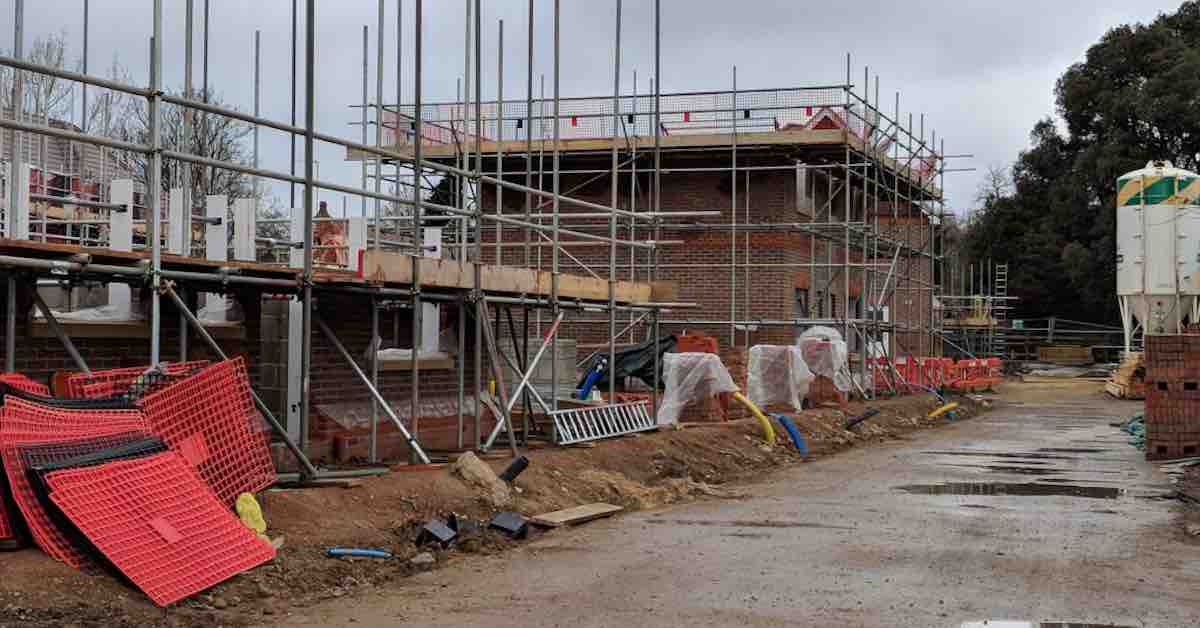The Government statement promising a million new homes during this parliament has prompted reaction from our editorial board.
A massive new urban quarter in Cambridge is among the Government ambitions which will be one of the first tasks of a ‘super squad’ of planners seeking to unblock major schemes across the country.
There will be the creation of development corporations, the launch of a planning skills delivery fund to clear backlogs and improve skills, increased fees levied on developers, further relaxation of rules to turn shops, takeaways and betting shops into homes and a cut in the administration required to convert barns and repurpose farm buildings.
There will also be a review of permitted development rights (PDR) to make it easier for the public to extend homes, convert lofts and renovate buildings.
Colin Brown, head of planning & development at Carter Jonas, said: “There is some encouragement in relation to suggestions of new lines of funding to help local authorities with their significant workload / backlogs.
“Development corporations may well have a place if the Government genuinely wishes to ramp up delivery, for example in Cambridge.
“Cambridge is, however, surrounded by a Green Belt so significant questions will remain as to how you capitalise on its ongoing potential without recognising that some Green Belt development will almost certainly be needed. How you leverage in new infrastructure is a further key question.
“What seems clear, however, is that national housing targets look set to be abandoned. The reference to urban areas and brownfield sites anticipates the fact that greenfield development in areas of greatest housing need do not really feature.
“While we would support use of brownfield land it is simply incorrect to suggest that the housing crisis can be met in this way. Greenfield and Green Belt land will both need to be considered.”
David Jones, managing director of Evans Jones, said: “Levelling Up Secretary Michael Gove reiterated the commitment to build one million new homes by the end of this current parliament in the July 24 speech.
“The focus is on inner city areas with high demand and constrained growth, including a proposed urban quarter in Cambridge. Consultations are planned on permitted development rights for converting department stores, office spaces, and more into housing.
“A £24 million planning skills delivery fund aims to clear backlogs and a ‘super-squad’ of planners will work on unblocking major housing developments. An Office for Place will promote design codes and individual character in local areas. However….
“After abandoning its manifesto pledge of 300,000 new homes per annum, for the Government to attempt to spin the line that one million homes (equivalent to 200,000 per annum) is a good result after 13 years in power, is reprehensible.
“Nothing in Gove’s speech addresses the housing crisis adequately. The absence of a comprehensive solution for housing affordability and reluctance to utilise vacant land, especially in the Green Belt, has drawn opposition, even from Gove’s fellow Conservative MPs.
“Overall, I do not believe the proposed measures will resolve the housing shortfall or gain acceptance, due to concerns and opposition from various stakeholders (including those of some of his fellow MPs).
“This is yet another example of a desperate Government pandering to NIMBYs in a last ditch attempt to try to protect a diminishing electorate.”
Karen Jones, partner at Blandy & Blandy, said: “The announcement made is a precursor to the proposed NPPF changes abandoning housing targets and is a sure sign that the proposals to abandon those targets will come to fruition in September when the new NPPF is published.
“The money and regeneration objectives of the statement are welcome but how will these proposals fix a planning system that is totally broken.
“The political manipulation that is evident in abandoning housing numbers everywhere except the 20 biggest cities and all 33 London boroughs, is short-sighted and will not deliver the homes needed. In fact, the Government are simply treading water until an election.”
Andy Moffat, head of planning at Savills Cambridge, said: “Government support to deliver the homes people need and address the wider housing crisis is always welcomed. As a country, what we need are many more well-designed homes to support healthy and sustainable communities.
“Cities including Cambridge are the right place to provide a proportion of these, especially where brownfield sites are available for re-use. The scale of the crisis is such though that the need for new homes exists in all communities and for all types of homes.”
Brian Dowling, partner at Boyes Turner, said: “Obviously, any positive change, promise of a change to policy, or to introduce new funding to the planning system, is to be welcomed.
“The Government had arguably been a bit too comfortable neglecting or even diminishing residential development output and we are pleased to see action being taken, albeit perhaps too little too late.
“The commitment to delivering a million homes across the five-year Parliament is a commitment to 200,000 homes a year. There is a tacit acknowledgment that it won’t be feasible to meet the 300,000 home target.
“The new funding, aimed at addressing planning backlogs and for upskilling in specialist planning and policy areas, is welcome. The industry acknowledges that the planning process is the single biggest source of delay to the delivery of new homes and that local authority planning teams lack the resources needed.
“That said, the announced funding only equates to circa £100,000 per council (if distributed evenly) which will help but is not the step change required. It is hoped that this announcement is the prelude to the Treasury ‘opening the taps’ to provide significantly more funding at the Autumn Statement or next Budget.”
He said large housebuilders stand to benefit more than SME housebuilders if attention is focussed on the two extremes of householder applications/domestic extensions and large scale developments.
He went on: “There are a lot of compliant applications and consented schemes which fall between these extremes which also need attention both in terms of determination and clearance of planning conditions which will also be key to delivering the housing numbers needed to address the housing crisis. We would hope that central Government and local authorities do not lose sight of this.
“The other main thrust to the announcement is to focus on enabling development of larger brownfield regeneration sites, as opposed to developing on the edge of settlement boundaries (ie in the Green Belt). Urban regeneration sites, whilst politically more acceptable, can take longer to deliver and we would have liked to have seen an equal commitment to Green Belt release for sites at the edge of towns and cities that have potential for being delivery more quickly.”
David Bainbridge, director in Savills central planning team in Oxford, said: ‘The focus on planning as a vehicle for investment and economic growth here is positive. In terms of implementation, we will need to see cross-party consensus on investment in planning skills relating to development – beyond planning officer roles – and it will be interesting to know where the pool of professionals to create the ‘super-squad’ will come from. The devil will, as always, be in the detail.”
Andrew Raven, director in Savills Urban Design Studio, said: “Cities and large towns are the most sustainable locations for new homes. However, many of our existing urban areas have already considered their capacity for regeneration sites. For example, Oxford – where lack of affordability is impacting its function as a driver of regional growth – already has to look outside of its boundaries to deliver desperately needed new homes.”
Mike Shearn, group investment & development director for Haslams Estate Agents, said: “Our huge supply side housing crisis is the result of many intentional and often unintentional consequences of various Government initiatives over many years.
“Buy-to-Let landlords have been hit hard and so the volume of PRS properties has declined as investors have left the market – the result being huge rents rises for tenants, ironically the very people Governments have sought to protect.
“Likewise the volume of new homes being built is bottoming out to levels not seen for decades as the planning system has lacked investment and new homes targets are now, to all intents and purposes, just an aspiration rather than a hard target.
“Within this context the industry drifts, lacking direction, investment, and big ideas. Unfortunately, we got nothing that will address the fundamental housing problems we face and so I’m disappointed and underwhelmed but I’m not at all surprised.
“If things are to change then the industry can no longer be kicked around and used like a political football with a new team manager every six-12 months. It’s far too important for that.
“It’s time for big ideas and a long-term plan that has cross-party support. Political parties need to bang heads and put the needs of the country over those of their members. There may be uncomfortable conversations but leadership is not about making easy and always well-liked decisions but rather making the right decisions.
“This will create clarity and confidence which in turn will stimulate huge investment and deliver the volumes of homes we need across the whole country.”
Ifti Maniar, planning director at WWA Studios, said: “To see reinvigorated support for our under-resourced local authorities is commendable, as well as new financial support to close the skills gap and large application backlog. This announcement is most welcome to hear, as the time we must wait for planning application responses is far too long. Unfortunately, there is no clarity on how the Government deals with a large appeal backlog.
“It’s no better exemplified than with the ‘new urban quarter in Cambridge’. The Environmental Agency has already warned that they will need a sufficient, sustainable water supply should the development be ‘turbocharged’, and the local Tory MP describes Gove’s Cambridge housing plans as ‘nonsense’. It is interesting to see how this proposal progresses!”
© Thames Tap (powered by ukpropertyforums.com).
Sign up to receive our weekly free journal, The Forum here.

















